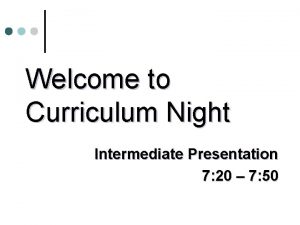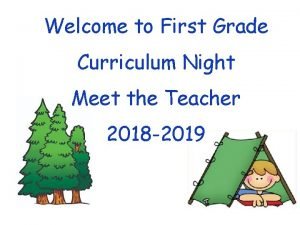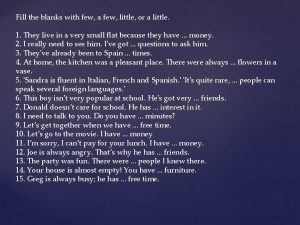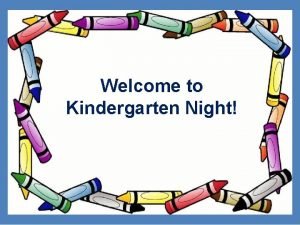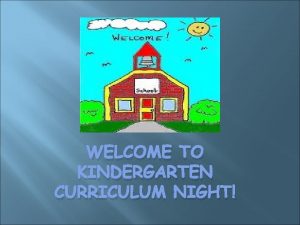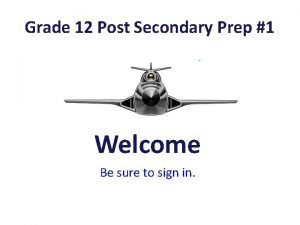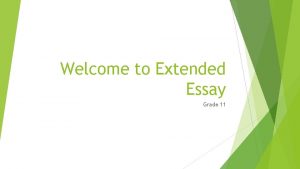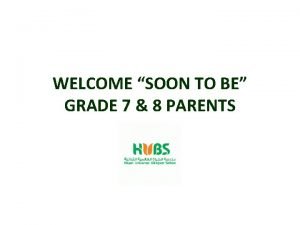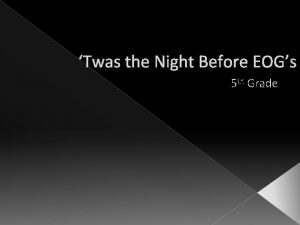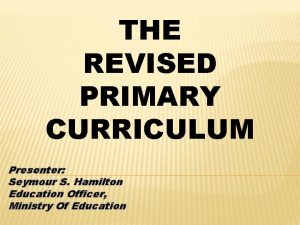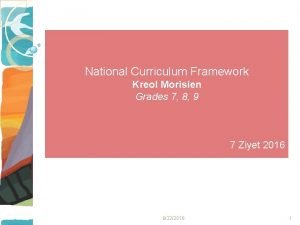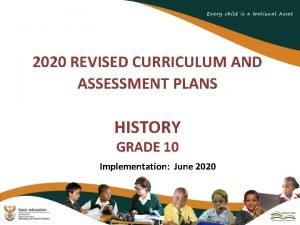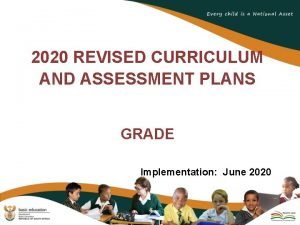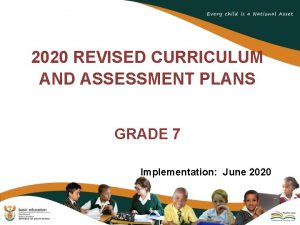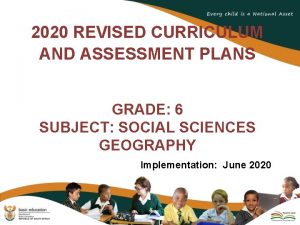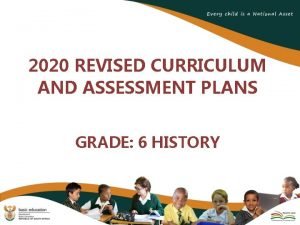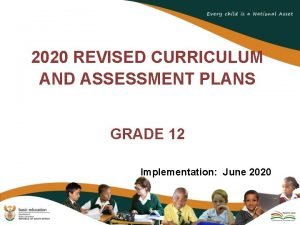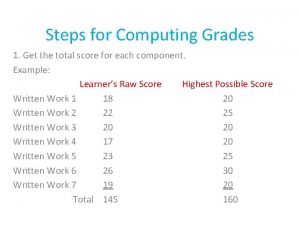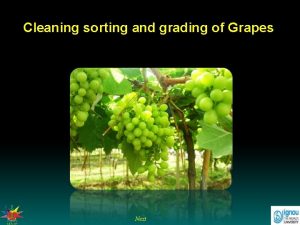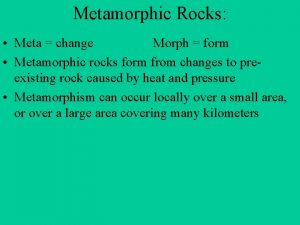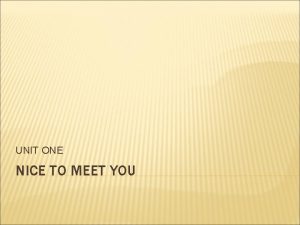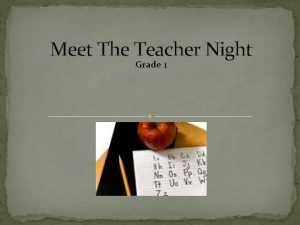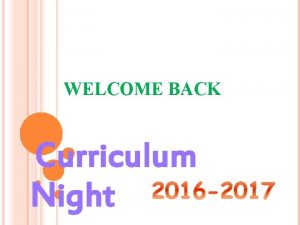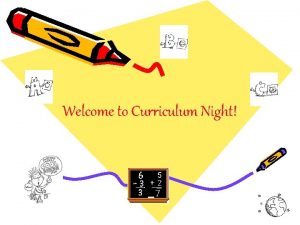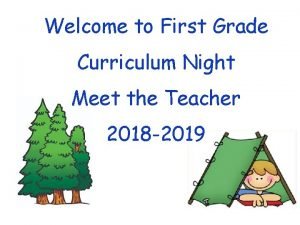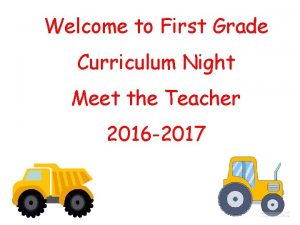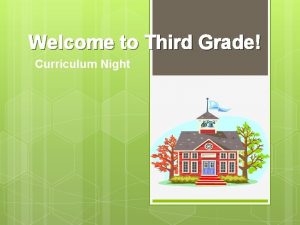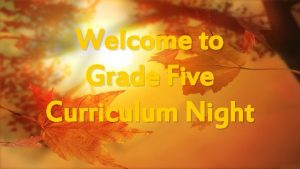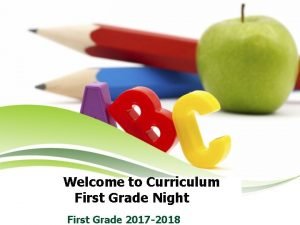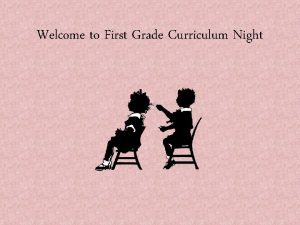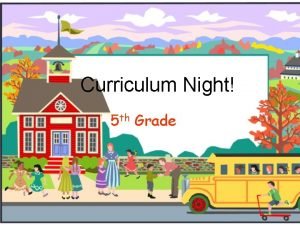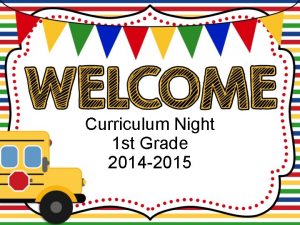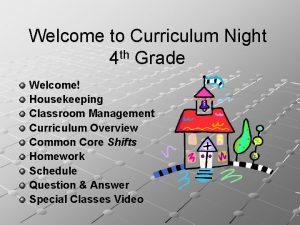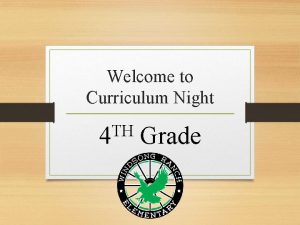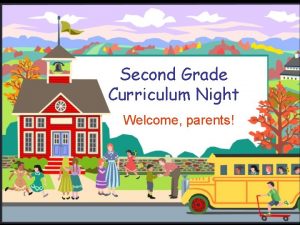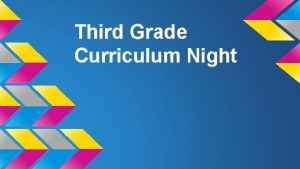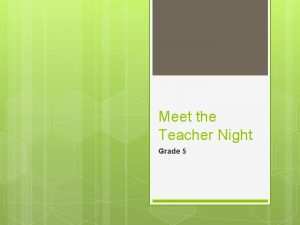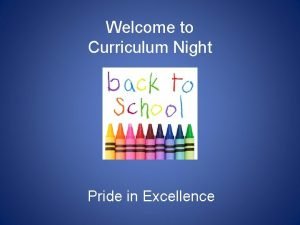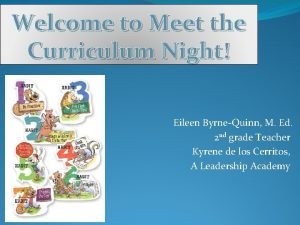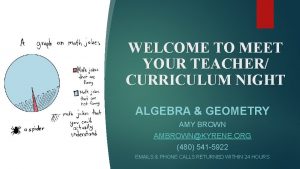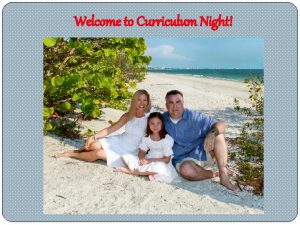Welcome to 3 rd Grade Curriculum Night Meet



































- Slides: 35

Welcome to 3 rd Grade Curriculum Night

Meet the Team!!! • Ms. Watson • Ms. Deming • Ms. Selby • Mr. Barnhart • Mr. Hiroshige • Mrs. Reeves • Ms. Fisher • Mrs. Couden • Ms. Troutman

Our Team Resume • • • Over 50 years of teaching experience 2 children 5 master’s degrees 1 national board certification 4 AIG (Academically Intellectually Gifted) Certifications • 9 bachelor degree’s • 2 Irwin teacher of the years • About $300, 000 still to pay in college debt

Guess Whooo? • • • Professional bowler Has triplet siblings Girls On The Run Coach National Champion Clogger Identical twin Captain of the cheerleading team • Italian • Soccer MVP in high school

Desired Outcomes for Irwin’s Students: - Attain levels of academic achievement consistent with abilities - Engage in abstract, creative, and effective reasoning - Apply insightful questioning - Develop a capacity to see interconnections among disciplines - Curriculum studied in greater depth through more challenging lessons and differentiated activities - Curriculum accelerated to include above-grade level material (when appropriate) - Advanced pace of learning - Integrated 21 st century learning

TD Strategies used During Instruction at Irwin • • Multiple Intelligences • Bloom’s Taxonomy • Jr. Great Books • William and Mary Read Curriculum • Curriculum compacting • Individual Contracts • Complex Problem Solving • Paideia Seminar Higher Order Thinking Skills & Questioning • Interactive Notebooks • Reading Workshop • Writing Workshop • Inquiry & Problem Based Learning • Math Olympiad & Math Detective • M 3 • Project Based Learning • Cooperative Learning • Creative Thinking

3 Key Ideas for Parents to Help Implement/Reinforce the Common Core State Standards at Home: • Think deeply – Ask open ended questions after they finish reading. Give them multi step math word problems. • Integrated learning – Incorporate learning as much as you can into the real world. • Showing how they know – Have students orally or written explain their answer or show you how they got the answer.

Grading • Power School (parents can access grades online by logging on with a username and password. Information will be sent home soon. ) • 60% Projects & end of unit tests • 40% Quizzes/Checkpoints, in-class assignments, exit tickets, interactive notebooks • CMS policy of no lower than 50%. Will see students raw score on paper, but 50% goes in grade book. Grading Scale A = 90 -100 B = 80 -89 C = 70 -79 D = 60 -69 F = Below 60

Teach for Mastery • Students who receive below a 79% on a unit test did not show mastery • They will be re-taught the material in small group during class and will re-test about a week later. The teacher will use the higher grade of the two as the student’s final grade.

Math Curriculum Math Assessments Used: - MAP data -Weekly Exit Tickets -Unit Tests -Quizzes/Checkpoints -Interactive Notebooks -In class assignments • Place value • Rounding • Comparing/Ordering numbers • Estimation • Elapsed time • Multi-digit addition/subtraction & properties • Unknown equations • Multi-step problem-solving • Data/Graphing • Multiplication • Division • Geometry (attributes of shapes) • Perimeter/area • Fractions • Order of operations • Measurement • Multi-digit multiplication

Personalized Learning • CMS Personalized Learning • Personalized Learning in Charlotte. Mecklenburg Schools aims to develop the whole child and empower them to take ownership of their learning by providing them with multiple pathways to demonstrate mastery learning in order to be successful and productive 21 st century citizens in an ever-changing world.

What Does Personalized Learning look like at Irwin?

What Does Personalized Learning look like at Irwin? • Genius Hour • This will take place in class 2 -4 times per week. • Students will choose to learn about self-selected topics of interest. • Students may bring in technology and materials from home to complete their final products.

There will be a Personalized Learning Informational Session held by Mrs. Ashford. Information regarding this will be communicated to parents soon. Please hold all Personalized Learning questions for this meeting.

Balanced Literacy 2 hours daily reading block: -reading workshop (60 minutes) -writing workshop (45 minutes) -interactive read aloud (20 minutes) -word work (20 minutes) Assessments: -Reading 3 D -DIBELS -DAZE -Weekly Spelling Tests -1: 1 Conferences -MAP Testing MAP dynamically adapts to a student’s responses – as they take the test. Students answer a question correctly and the test presents Structure: a more challenging item. If a students -Mini-lesson (10 minutes) misses a question, MAP will offer a -Independent Reading/Book simpler item. In this way, the test narrows in on a student’s learning level, -Clubs while teacher is conferencing or working with small engaging them with content that allows them to succeed. This testing is for the groups (45 minutes) instructional purposes of reading and -Share (5 minutes) math. -Cold Reads -Post it notes “Stop and Jots” -Weekly Reading Quick Checks

Reading Curriculum • Launching the Reading Workshop • Following Characters into Meaning (Fiction) • Nonfiction/Informational Reading • Poetry • Fables/Folktales/Myths • Social Issues/Series Book Clubs Writing Curriculum • Launching the Writing Workshop • Narrative writing • Informational/Explanatory Writing • Opinion Writing Pieces • Poetry

Science Curriculum • Matter • Soil/Plants • Energy • Earth Systems • Ecosystems • Human Body • Force/Motion • Assessments: tests, quizzes, experiments, interactive notebooks, in class assignments

Social Studies • Communities Changing Over time • Citizens and Government • Roles in the Community • Geography • People and Economics • People and Technology • Storytelling and Cultures • Assessments: tests, quizzes, interactive notebooks, in class assignments

What is an interactive notebook? • Your own personalized text book that includes everything you’ve learned throughout the year! • A helpful tool that may help you complete your homework. • Study tool for quizzes and tests • Great resource for end of the year review • Helps you stay organized! You never have to worry about losing papers. • Allows for the 4 C’s: Creativity, Critical Thinking, Collaboration, Communication!

How is it organized? • Begins with a table of contents to help with organization • The Right Side is teacher directed and is restricted for the teacher only. This is where you will learn new information and take notes on what you learn. You will learn exactly how to take notes on this side. • The Left Side is the students’ side. This is the side that you show your understanding of the right side. It is your independent practice. You will use both sides to help you at home when you are studying.

Example of Teacher Notes – Right Side -At the beginning of the year the notes are more guided. By the end of the year the students are taking a majority of their own notes. This is a skill they will need to take with them through college.

Left Side Examples Foldables

More Examples: Pictures Advertisements Poems Post Cards Technology

Proficient Basic Beginning Criteria 3 2 1 Right Side (Teacher Side) The assignment including handwriting is neat, and completed with care Notes are complete and well detailed 6 4 2 Left Side (Student Side) The assignment including handwriting is neat, and completed with care The assignment is completed according to instructions given The assignment is correct The left side shows a thorough understanding of the right side (2 points) Color has been used to make the assignment neat and attractive. 3 2 1 Organization and Timeliness Pages are attached securely, left side/right side order intact Pages numbers and dates are on each page The notebook assignment was completed and turned in on time o o o 1 Creativity Student’s assignment is creative and thought provoking. 2 Evidence of Additional Thinking/Effort – WOW Factor Student put exceptional effort into both right and left side assignments. Assignment goes above and beyond the requirements. o o SS/Science Interactive Notebook Rubric Sample

What are the EOG’s? • EOG stands for the End of Grade Testing. It is a test given by the state to all students in grades 3 -8. Third graders take test in two areas, reading and math. Both are all multiple choice. • Students receive a score for each subject. The scores are called levels and they range from 1 to 5. Levels 1 - 2 are considered not passing Level 3 is considered passing but not meeting college and career ready standards. Level 4 is passing, but is meeting college and career ready standards Level 5 is passing, and all kids are meeting the college and career ready standards. • All third grade students are expected to make a level 3, 4, or 5 on the EOG in order to be promoted to the fourth grade. The EOG will be given toward the end of the school year.

What if my child does not pass the EOG? • If they are proficient, they are promoted to Grade 4 • If they are not proficient, they may take a retest of the EOG (different form) or the alternate test (in development) if they have not reached another benchmark. (BOG, TRC, MAP) • If they are proficient on the EOG retake or the alternate test, they are promoted to Grade 4 • If they are still not proficient, they may qualify for a “good cause exemption” and be promoted to Grade 4 • If they do not qualify for a “good cause exemption, ”they are then enrolled in a Summer Reading Camp

Projects One Project per quarter • Students should be able to do independently • You may assist students, but it should be their own work • You will be given about 4 weeks to complete • Directions & rubric will always be provided ahead of time

BYOT • Allowed to bring their own devices and log onto the school network on September 14 th • Devices must be checked in to the teacher every day first thing in the morning • Devices stay locked up throughout the day unless the students have permission to use them by the teacher • Not allowed to let others use their devices! • Do not take them to recess or lunch • Must sign BYOT compact and return it to school before you bring yours in

BYOT FAQ’s Q: What type of device is best? A: A device with the internet (ie. IPAD, IPAD mini, Iphone, Lap top, etc. ) Q: Should I bring my device everyday? A: Yes, so that the teacher can include them into her plans each day and not have to worry about students forgetting theirs. Devices will be used a lot this year with personalized learning! Q: What will we use the BYOT devices for? A: Personalized Learning in Math daily, Razkids, Dreambox, Word Work, Writing Workshop (dictionary), Reading Workshop (read), Socrative (exit ticket), kids blog (literature response), and so much more!

Homework • About 60 minutes per night • Purpose: reinforce what is being taught at school. Reflection of that day’s lesson. Students should be able to complete independently. • Typical night’s homework: Spelling/Vocabulary Math---Worksheet Reading---30 minutes and complete reading log • Occasional: study or finish unfinished work • Weekends---Only unfinished work or projects • Depending on your child’s teacher, he/she may need to get their reading log, agenda, and behavior log signed. • Homework should be turned in daily. There will be a consequence for those students who do not turn it in. It may vary depending on teacher.

Extra Credit • There will be no extra credit projects or assignments to raise grades. There will be bonus questions on some tests that are worth additional points.

Student Conduct • School-wide positive behavior reinforcement – OWL feathers • Each teacher does a positive behavior reinforcement – ie. Marbles, point system, classroom economy/class store, treasure box Consequences: • 0 = Great Day! • 1 = First Warning • 2 = Second Warning • 3 = 15 min. Silent Recess & Think Sheet • 4 = 30 min. Silent Recess & Parent Contact • 5 = Office Referral

Teacher/Parent Communication • Email, which is most preferred! Do not e-mail ANY dismissal changes to your child’s teacher. Send in a note with your child or call the office. • Newsletters/Updates weekly by e-mail (paper by request) • Phone calls • Notes in their homework/communication folders

Field Trips We will be going on some field trips this year. We have one mandated CMS field trip. The budget will determine which and how many field trips we take. Here were the field trips that 3 rd grade did last year to give you an idea: • Imaginon play • Rosedale Historic Site (CMS) • Government Building • Fire Safety held @ Irwin If you have any connections locally, for possible field trips that tie in with curriculum, please let us know!

Questions? ? ? Thank you for taking the time to come in tonight! ☺
 Welcome to curriculum night
Welcome to curriculum night Welcome to curriculum night
Welcome to curriculum night Till we meet till we meet at jesus feet
Till we meet till we meet at jesus feet I meet raisa last night. ... signed ... t-shirt. *
I meet raisa last night. ... signed ... t-shirt. * Welcome welcome this is our christmas story
Welcome welcome this is our christmas story Welcome to kindergarten night
Welcome to kindergarten night Symbols of night by elie wiesel
Symbols of night by elie wiesel Silent night holy night all is calm
Silent night holy night all is calm Curriculum night prayer
Curriculum night prayer What is kindergarten curriculum night
What is kindergarten curriculum night What is kindergarten curriculum night
What is kindergarten curriculum night Welcome to grade 12
Welcome to grade 12 Welcome to grade 11
Welcome to grade 11 Welcome to grade 7
Welcome to grade 7 Welcome grade 10
Welcome grade 10 I hope you had a nice summer welcome to third grade
I hope you had a nice summer welcome to third grade Welcome to fourth grade
Welcome to fourth grade Twas the night before 5th grade
Twas the night before 5th grade Revised primary curriculum grade 1-3
Revised primary curriculum grade 1-3 National curriculum framework 2016
National curriculum framework 2016 2021 revised curriculum and assessment plans
2021 revised curriculum and assessment plans 2021 revised curriculum and assessment plans grade 7
2021 revised curriculum and assessment plans grade 7 2020 revised curriculum and assessment plans grade 7
2020 revised curriculum and assessment plans grade 7 2020 revised curriculum and assessment plans
2020 revised curriculum and assessment plans 2020 revised curriculum and assessment plans grade 7
2020 revised curriculum and assessment plans grade 7 2020 revised curriculum and assessment plans grade 6
2020 revised curriculum and assessment plans grade 6 2020 revised curriculum and assessment plans grade 6
2020 revised curriculum and assessment plans grade 6 2020 revised curriculum and assessment plans
2020 revised curriculum and assessment plans Grade computing
Grade computing Jumping rope history
Jumping rope history Culinary
Culinary Milk grades
Milk grades Grading of grapes
Grading of grapes Meta - change morph -
Meta - change morph - Meet and greet agenda
Meet and greet agenda A:nice to meet you b
A:nice to meet you b
